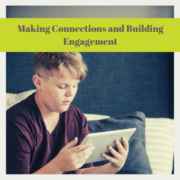Parent as the Teacher

The impact of parent involvement is immeasurable when it comes to student success. Decades of research indicates that involved parents are one of the main factors to a student’s educational success. As educators, we certainly recognize the extent to which parents are pivotal to our work in the classroom. A popular adage claims that “home is a child’s first classroom; parents, the first teachers.” According to data and experience in the classroom, teachers would almost unanimously agree to that notion—we cannot do it without the help of parents.
As educators, we must also be cognizant of the “parent as teacher” mindset that students unknowingly bring into the classroom. Kids only know what they see, hear, and live. Often times, a student’s behavior, manner of speaking, and opinions are greatly indicative of a few influential factors: friends and family. Parents intentionally and sometimes unintentionally teach or model certain behaviors or mindsets. When you do the math, parents are obviously the most influential figure in a child’s education. Any given year, children spend eight times as many hours at home than they do at school.
That said, parents then become our greatest allies when it comes to knowing our students best. At the start of the year, many teachers prepare for the back-to-school night by creating some form of parent questionnaires. These small surveys or get-to-know-you cards inevitably get tossed in a drawer and likely forgotten. However, an easy tweaking of the questions could allow parents to “teach” their child’s teachers some of the vital information necessary for success in the classroom. Take a look at some questions that would allow parents to educate the teacher on their child’s learning styles.
How do you handle discipline at home? This question allows parents to explain what has or perhaps has not worked with their children in terms of behavior management. It also gives teachers some insight as to how familiar a student is with receiving consequences.
What activities or topics spark your child’s interest? How do you know when he/she is engaged? Both of these questions allow teachers to get some valuable background information as to how to best reach a student. Parents also provide teachers with the insight as to how a specific child displays interest.
How does your child exhibit frustration or stress? Again, emotional growth is something that children mostly develop outside of school among family and peers. Knowing exactly what it looks like before a child is pushed to the emotional edge will help teachers to recognize and ease frustrations before they become significant issues.
How much does your child depend on you for help with schoolwork at home? This question gives teachers an inside look at the level of academic independence and self-advocacy that they can expect from students. Of course, parents are always eager to help their children with anything; however, the level of support needed in the classroom is often reflective of how reliant the child is at home.
What is the best way to encourage your child? Like all of the previous questions, teachers can truly rely on parents as the experts when it comes to positive reinforcement and encouragement in the classroom. Some children respond to competition, while others may be more self-motivated. Some students like to know exactly how to manage time and assignments, while others prefer a more student-driven or creative approach to learning. Whatever the case, parents truly have the wherewithal to help teachers learn about their students quickly and accurately.
This expert knowledge of our students can really only come from one place—home. Therefore, when parents are more involved, teachers and students both reap the benefits of this sort of “insider information.”






